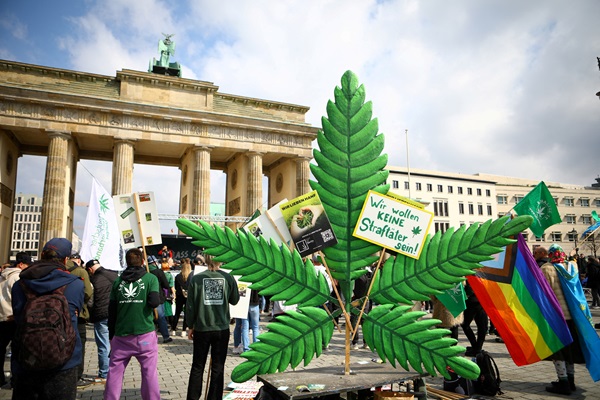 People meet for "World Stoner Day", a demonstration with joint smoke-in for the immediate decriminalization of cannabis, in Berlin, Germany, on 20 April 2023.;
Credit: REUTERS/Nadja Wohlleben
People meet for "World Stoner Day", a demonstration with joint smoke-in for the immediate decriminalization of cannabis, in Berlin, Germany, on 20 April 2023.;
Credit: REUTERS/Nadja Wohlleben
BERLIN (Reuters) - On Friday 23 February 2024, Germany joined the small group of countries and jurisdictions that have legalised cannabis when the Bundestag passed a law allowing individuals and voluntary associations to grow and hold limited quantities of the drug.
The law passed by Chancellor Olaf Scholz's ruling three-party coalition legalises cultivating up to three plants for private consumption and owning up to 25 grams of cannabis.
Larger-scale, but still non-commercial, cannabis production will be allowed for members of so-called cannabis clubs with no more than 500 members, all of whom must be adults. Only club members can consume their product.
"We have two goals: to crack down on the black market and improved protection of children and young people," Health Minister Karl Lauterbach said at the start of a rowdy debate where the opposition accused him of promoting drug use.
"You are asserting in all seriousness that by legalising more drugs we will contain drug use among young people," said Christian Democrat legislator Tino Sorge. "That is the most stupid thing I've ever heard."
But Lauterbach said that this amounted to "sticking our heads in the sand": not only had cannabis use soared among young people, whose developing brains were particularly endangered, but drugs on the streets were both stronger and more impure nowadays, greatly increasing their harm.
Some 4.5 million Germans are estimated to use cannabis.
Germany becomes the ninth country to legalise recreational use of the drug, which is also legal in some sub-national jurisdictions in the United States and Australia. Many more countries allow its medical use as a painkiller. Cannabis remains illegal for minors as does consuming it near schools and playgrounds.
Some legislators questioned whether the new regulations would have much impact on dealing, since those who are unwilling to grow their own cannabis or join a cannabis club may still prefer to buy the drug.








